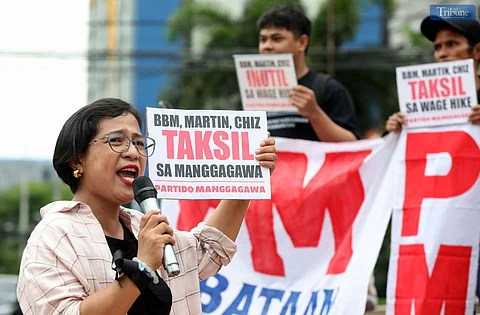
- NEWS
- the EDIT
- COMMENTARY
- BUSINESS
- LIFE
- SHOW
- ACTION
- GLOBAL GOALS
- SNAPS
- DYARYO TIRADA
- MORE

Proponents of the proposed P200 legislated wage hike in the House of Representatives are pointing fingers at the Senate for allegedly refusing to convene a bicameral conference committee, effectively rendering the much-anticipated pro-labor bill dead in the water.
The 19th Congress adjourned sine die on Wednesday without reconciling the conflicting provisions of House Bill 11376 and Senate Bill 2534, which proposed a P200 and P100 increase, respectively, in the daily minimum wage of private sector employees.
House spokesperson Princess Abante on Thursday claimed there was no one to blame but the Senate, which she said resisted efforts to sit down with the House in a bicameral dialogue that could have resolved the discrepancies.
“Let’s not sugarcoat it—the Senate killed the P200 wage hike bill,” Abante said. “We were ready to deliberate. We came in good faith. But what the Senate gave us was a take-it-or-leave-it ultimatum. They don’t want to negotiate; they just want us to comply. That’s not how democracy works.”
House labor and employment panel chair Fidel Nograles rejected a last-minute proposal from his Senate counterpart, Senator Joel Villanueva, to bypass the bicam and immediately adopt the Senate version for ratification and transmittal to Malacañang.
Senate leaders reportedly informed the House of their designated bicam members only on the eve of adjournment, making a full conference no longer viable.
Citing time constraints, Villanueva urged the House to approve the Senate version outright. But Nograles refused, saying the House preferred a “transparent and deliberative” bicameral process to ensure a fair compromise between both chambers.
Nograles contended that it is unjust that the House is being “bamboozled” and “cornered” into accepting the Senate’s version wholesale, claiming that the “bill deserves better.”
With neither chamber willing to concede, the measure quietly died alongside Congress’s adjournment.
“The failure to pass this is a clear lack of consideration for minimum wage workers who continue to survive on meager wages,” said Gabriela Rep. Arlene Brosas, one of the bill’s authors and designated bicam members.
Brosas told reporters last week that the House was willing to compromise — as long as the final figure was reasonable.
The Senate passed its version of the bill as early as February 2024, while the House approved its counterpart only days before the sine die adjournment. Still, lawmakers on the lower chamber argued that it was the Senate’s deliberate resistance to convene a bicam that ultimately doomed the bill.
Akbayan Rep. Perci Cendaña cast doubt on the Senate’s sincerity, suggesting that senators may have purposely delayed the measure.
“With just a few steps left, this could have been submitted to Malacañang to be signed into law. What a wasted opportunity. Long weekend plans took precedence over the welfare of workers,” he said.
Cendaña and ACT Teachers Rep. France Castro also pointed to President Ferdinand Marcos Jr., saying the Chief Executive ignored repeated appeals from labor groups to certify the bill as urgent.
“The Senate’s refusal to pass the P200 wage hike exposes their true allegiance. They serve the capitalist class, not the Filipino people,” Castro said. “While they waste time on political theatrics, millions of workers continue to struggle with poverty wages.”
She also alleged that Marcos may have influenced the Senate to stall the measure, especially after the President publicly raised concerns about the economic and inflationary consequences of a mandated wage increase — particularly its adverse impact on micro, small, and medium enterprises (MSMEs).
Had the bill been passed, it would have marked the first legislated wage hike in nearly four decades — the last being in 1989, when Congress enacted the Wage Rationalization Act (RA 6727).
The Employers Confederation of the Philippines (ECOP), the country’s largest employers' group, has consistently opposed a legislated wage hike, warning of serious setbacks to MSMEs and negligible gains in return.
ECOP president Sergio Ortiz-Luis Jr. emphasized that only about 10 percent of the nation’s 52 million-strong labor force are minimum wage earners — excluding vast segments like farmers, fisherfolk, public transport drivers, market vendors, and those in the informal sector.
Other business groups warned that mandating a wage hike could lead to layoffs or even the closure of small businesses.
Still, labor advocates argue that current wages are woefully inadequate in the face of soaring prices for basic needs such as food, housing, and transport.
Another proponent, House Deputy Speaker Democrito Mendoza of the Trade Union Congress of the Philippines. the country's largest labor federation, said this could have been Marcos' legacy if the bill had been successfully signed into law.
